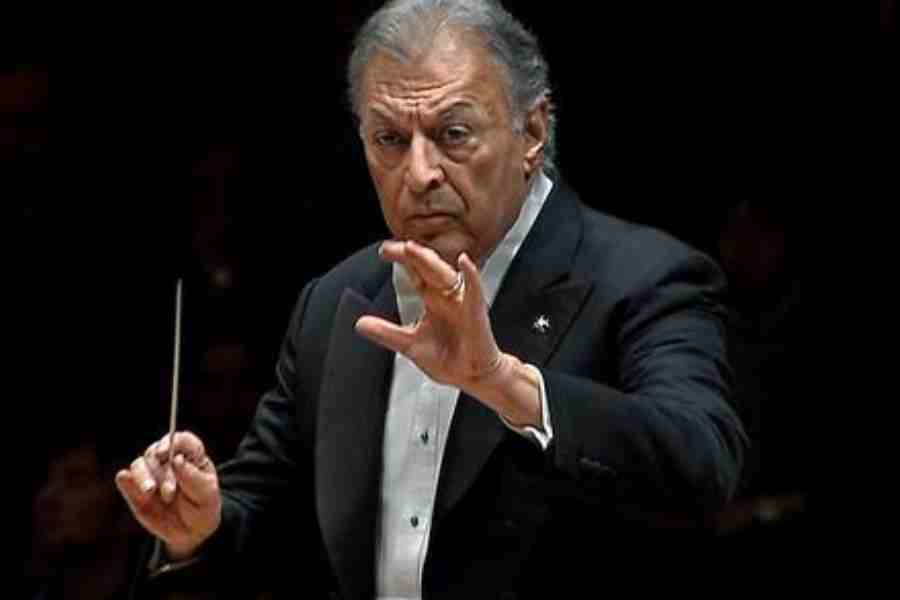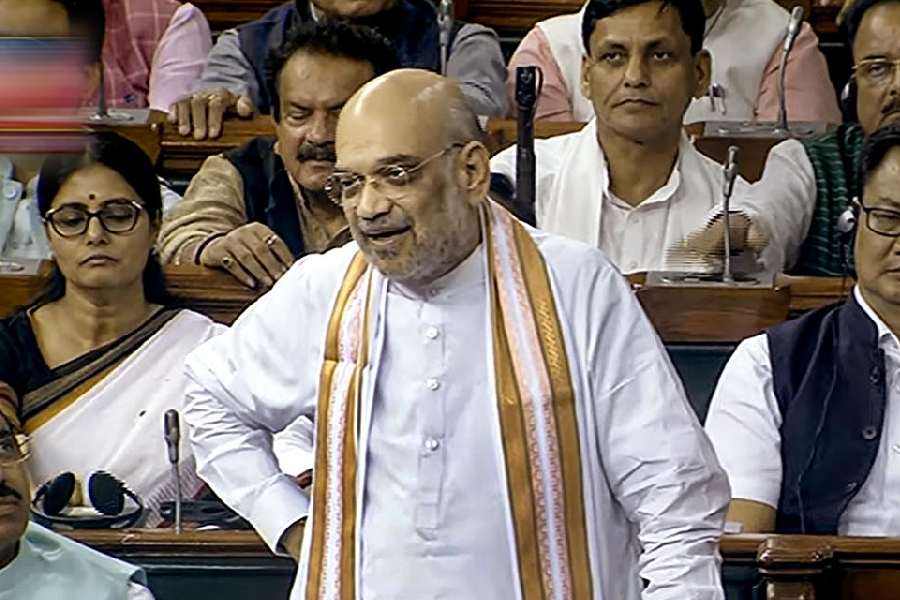When Zubin Mehta, the renowned conductor, performed in Mumbai over the weekend, one of the scheduled compositions was Franz Schubert’s Unfinished Symphony.
Mehta’s visit to his hometown this time had another unfinished element, too.
With members of the exclusive Chambers in attendance at the Taj Mahal Palace hotel in Mumbai, Mehta, 87, was in conversation with journalist Karan Thapar last week.
The conversation, uploaded on The Wire news portal, mostly focused on “Bombay boy” Mehta’s connection with the metropolis. Towards the end, the very political Thapar, who famously got Narendra Modi’s goat when he was Gujarat chief minister by asking the politician about the 2002 riots, asked the acclaimed musician what he thought about contemporary India.
Thapar: “My last question, Mr Mehta. And I ask you deliberately because you are still an Indian. You are proud of your Indian passport, you love your country. What do you think of the sort of country we are becoming? I am talking about the treatment of minorities, Muslims in particular. Your friend Yusuf Hamied (Cipla chairman) is a Muslim. I am talking of the treatment of journalists....”
Mehta: “Listen, I will tell you frankly. I gave an interview to The Times of India over the phone from Los Angeles two weeks ago. A very good interview. And I read it. It was verbatim... perfect. The last sentence I told the man — and I met him recently and he admitted — they took out the last thing I said. ‘I hope my Muslim friends can live in peace forever in India’ (applause breaks out from the audience at the venue at The Taj, Mumbai). And that was... that was... that was not printed in The Times. It was cut off. And the... and the writer couldn’t give me a reason why.”
Thapar: “They don’t want to offend Mr Modi and the government.”
Mehta: “How will that, how would that offend anybody?... This morning I read that they were burning churches in Pakistan. One has to get over this madness of religious persecution. Hopefully, things will change.”
At least the Mumbai and New Delhi editions of The Times of India published the full-page interview of Mehta earlier this month in the run-up to his concerts in Mumbai on August 19 and 21 — the first time the musician conducted an Indian orchestra.
In the print edition of The Times of India, the interviewer wraps it up by asking “...if you would like to give a message? Separation of culture and politics, perhaps?”
To which, Mehta replies: “Well, this morning I read that Mr Navalny (jailed Russian Opposition leader Alexei Navalny) has received a longer sentence… in Russia; I don’t know how those things can go on. I am completely in support of Mr Navalny. I was in Berlin when he was in the hospital there. Unfortunately I didn’t… I wasn’t able to visit him. But I hope, I hope soon, things will change in Russia too. That people will think a little bit more logically and diplomatically.”
The interview ends in the print edition with Mehta’s reply.
But the online edition of The Times of India shows another question and answer after the request for the message from Mehta.
“Q: And in India?
“A: Well, I speak to a lot of Indian friends, and I get my reports from them. I hope my Muslim friends in India will live in peace forever.”
It was this omission in the print edition that Mehta flagged on his own during the conversation with Thapar. The omitted question and answer in the printed version of The Times of India account for 31 words in the 2,500-plus-word interview with Mehta. In the online version some more questions and answers on Jawaharlal Nehru, Indira Gandhi and Rahul Gandhi follow. In print, this part appears as an inset.
The content of print and online editions of newspapers need not always be identical. In fact, several newspapers guide their readers to their online editions for access to longer versions of interviews and articles that may not have been accommodated in full because of space crunch in the print edition.
The printed version of The Times of India’s interview with Mehta also carries a QR code that steers readers to an online report on the maestro and the Indian orchestra.
It remains a mystery why the interviewer could not explain to Mehta when he enquired about the missing statement. On Sunday night, The Telegraph, which competes with The Times of India in Bengal, emailed questions to the available address of the Chair of the editorial board of The Times of India in an attempt to gain an insight into why the statement was omitted in the print edition. Till Monday afternoon, no reply was received from the Chair.
Then this newspaper sent the same questions to the executive editor of The Times of India, by when The Wire uploaded a report on the omission flagged by Mehta.
Vikas Singh, the executive editor of The Times of India, replied: “Earlier today, we tweeted the following reply to The Wire’s report: ‘The TOI interview was long and had to be trimmed to fit the page. The line being referred to was towards the end of the interview and got left out in that process. Subsequently, Mr Mehta spoke to the interviewer about its omission and it was restored online.’
“This is the only official statement we will be making on the subject.”
Usually in India, newspapers have been reluctant to report on the editorial decisions of other newspapers, especially those that are direct competitors. Media coverage of media has been largely confined to the business section of newspapers.
The Telegraph also refrains from commenting on the editorial decisions of other newspapers. But in this instance, Mehta brought up the issue on his own. Mehta was not talking about coverage of a news conference or a meeting, in which case it is up to the editor to decide which part should be published or omitted. For instance, it is not incumbent upon a newspaper to publish every sentence that a public figure or person in power utters.
The musician was referring to an exclusive interview he gave to the newspaper. Even in exclusive interviews, if the speaker makes statements that are unlawful and inflammatory, a newspaper is justified in omitting them.
However, this newspaper is reporting this matter because Mehta’s comment dealt with one of the most important questions confronting contemporary India and his disclosure to Thapar suggested the musician’s consent was not taken before it was omitted from the print edition.
An incongruous element was also added with Mehta criticising events in Russia and Israel in the interview, only to witness his wish for his own home country being omitted.
Of course, editors have the right to decide what to publish. The blue pencil (with which articles used to be edited once) and the beep machines are prudent tools of the trade these days while reporting on some of the foul-mouthed public figures in India now. But neither Mehta nor what he said falls into that category.
A thin line divides the right not to publish and censorship.
A telling moment unfolded towards the end of the conversation between Mehta and Thapar at The Taj.
In response to a question on the situation in India, Mehta criticised the Israeli government. Pushing the envelope, Thapar asked Mehta: “Two of the countries you love the most, India and Israel, are both going through bad times. Does that upset and hurt you?”
Mehta smiled and replied with a question: “Well, is India going through bad times?”
Thapar: “It depends upon whom you talk to.
Mehta: “Yes” (chuckles).
Someone from the audience cried out: “No”.
Thapar: “It depends entirely on whom you talk to. Ask Indian Muslims, they will give you a different answer. Ask rich Indians, they will give you a different answer. There are a lot of them here....”
Thapar went on to mention journalists and Opposition politicians.
A voice from the audience rings out: “No politics.”
Mehta: (Looking at the audience) “You all have opinions here. Let us end with that opinion.”












